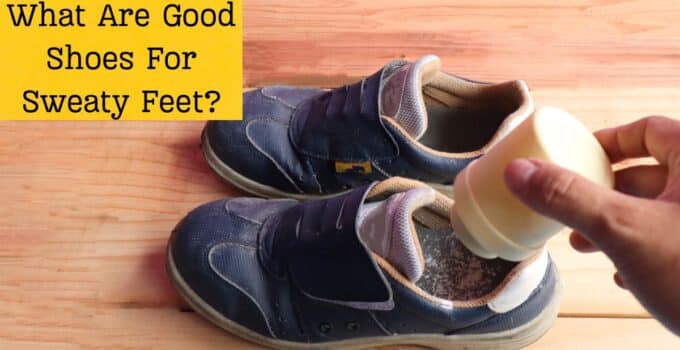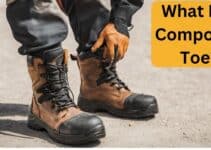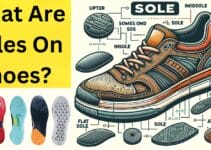Hey there! Sweaty feet are quite a problem, especially when fitting shoes. Butt do not worry! We have your back. What are good shoes for sweaty feet? It is not just about finding a pair of shoes. We mean shoes that keep your feet dry, comfortable, and fresh all day. So, if you do not like feeling in a wetland every time you walk, stay with us because we will be breaking it down to finding the ideal footwear for your sweaty feet. Let’s get started!
How To Manage Sweaty Feet?
Why do our feet sweat more than other parts of our body? The answer lies in science! Medically referred to as plantar hyperhidrosis, sweaty feet occur when sweat glands in your foot produce more sweat than necessary to control body temperature. But why does this happen? What makes people have sweaty feet can be several things, including:
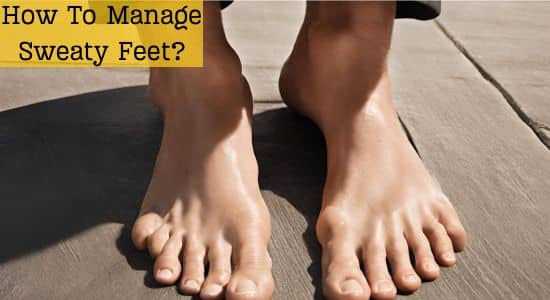
Overactive Sweat Glands: In such cases, an individual has naturally higher levels of sweat glands on their foot, which makes them sweat more.
Hot Weather and Physical Activity: Warm temperatures and physical exercise can cause your body to produce more sweat, including those in the foot region.
Stress and Anxiety: Emotional stress or anxiety can stimulate your body’s sweat glands, leading to sweaty feet even when you’re not physically active.
Footwear and Socks: This condition may be exacerbated by wearing non-breathable materials in shoes or socks, trapping heat and moisture.
Now, why should one bother about having sweaty feet? As well as being uncomfortable to have soggy socks and shoes all day long, excessive sweating can also lead to several other problems, including:
Foot Odor: When combined with bacteria present on human skin. Perspiration results in an unpleasant odor, which usually emanates from our leg area, including some footwear.
Fungal Infections: Damper areas are the home to fungi, like athlete’s foot, which itches, reddens, and annoys.
Skin Irritation: Repeated moisture exposure may make the skin tender and susceptible to blistering, corns, or calluses.
Social Embarrassment: I tell you what, nobody wants their shoes off, spreading a smell of sweaty feet in the room!
But don’t worry! There are numerous strategies and solutions for dealing with sweaty feet so that they always feel fresh and dry. We will take care of everything from selecting proper shoes and socks to maintaining good foot hygiene. So, let’s get started by looking at what makes a great shoe for sweaty feet.
Characteristics of Good Shoes for Sweaty Feet
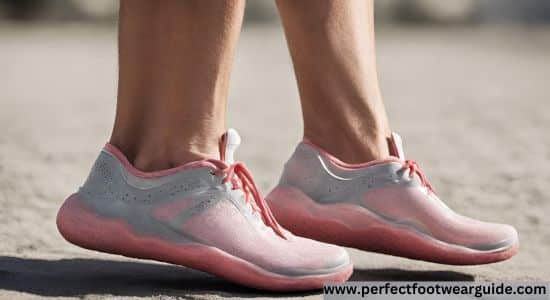
Now, look at why some shoes are best for people with sweaty feet. When you search for the best sneakers that will keep your feet cool and dry, consider these main factors:
Breathability: First, you need breathable shoes, i.e., ones that breathe. Look for footwear made from mesh or canvas, especially certain kinds of leather. These sorts of materials permit air circulation around your legs, thereby assisting with the evaporation of sweat to provide comfort.
Moisture Wicking Properties: Choosing shoes that can pull off perspiration from your skin, not just opening up, is also important. Find shoes with a moisture-wicking lining or inserts that take up sweat and dry your feet.
Antimicrobial Features: Besides water, bacteria are also released when feet sweat. Therefore, wearing an antimicrobial footwear is advisable. These shoes have been treated to resist bacterial growth, avoid odor, and keep the feet clean and fresh.
Proper Fit and Comfort: However breathable or moisture-wicking shoes are, if they don’t fit well, they won’t be comfortable. Hence, select shoes with adequate support and cushioning for your feet while allowing freedom of movement. A snug but not too tight fit prevents excessive sweatiness and pain.
Remembering these characteristics can help you find the best pair of shoes for controlling sweaty feet. Let’s examine shoe types in more detail to enable you to make a sensible judgment rather than take our word for it.
Best Shoe Materials for Sweaty Feet
Depending on the material they are made of, certain kinds of footwear are better at preventing sweaty feet than others. Let’s go through some great materials that will provide a cooling effect on your legs:
Mesh: Mesh is often used in sports sneakers because it provides good ventilation. This open weave allows air to flow freely into the shoe, ventilating your feet and quickly drying perspiration.
Canvas: Canvas footwear is an alternative that allows air circulation and keeps the foot cool even during hot weather conditions. In addition, the canvas usually has machine-wash features, making it easy to clean under nearly maintenance-free conditions.
Leather: That said, not all leather breathes equally well. However, full-grain or genuine leather shoes are more breathable than synthetic ones, such as polyurethane, which tend to suffocate feet. Furthermore, these shoes are long-lasting, so they can customarily fit foot contours after some time.
Synthetic Materials with Moisture Wicking Properties: Some of today’s shoe brands use synthetic moisture-wicking materials like polyester or nylon to wick away sweat faster and keep feet dry all day. The latter fabrics pull perspiration off your skin for quicker evaporation, keeping the foot feeling fresh at all times.
Natural Fibers: Shoes of cotton or bamboo fibers are also great for sweaty feet. Everyday wear is better suited to these materials because they allow air through them and do not cause friction on one’s skin.
But remember, your choice should be to favor footwear that promotes airflow and has moisture-wicking properties. Therefore, it will prevent excessive sweating. Paying attention to what your shoes are made from can help you achieve a comfortable, odor-free environment for your feet, no matter how hard things get during the day.
What Are Good Shoes For Sweaty Feet
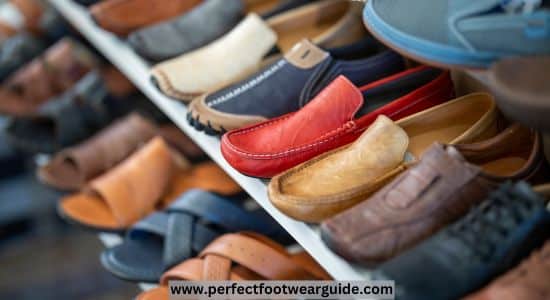
Now that we’ve discussed the materials to look for let’s move on to types of shoes that are great for those fighting sweaty feet. You can wear one of these pairs while going to work out at the gym or hang out casually with friends:
Running and Athletic Shoes: If you are a fitness enthusiast who likes sweating it out, consider investing in quality athletic or running shoes. Choose from designs with upper meshes that allow airflow, cushioned linings, and moisture-absorbing fabrics that are suitable even during intense exercises.
Casual Sneakers: Many people find casual sneakers perfect for daily use. Use breathable options such as canvas or leather with perforations or mesh panels for enough ventilation. These flexible flats are waiting when you need to pick something in town, get coffee on your way home, or even spend time together.
Sandals and Flip-Flops: When it gets hot outside, sandals and flip-flops become the most comfortable footwear. Buy models with footbeds contoured according to the shape of your feet and other features such as adjustable straps so that they fit properly without squeezing too tight but still do not make them sweat.
Work Shoes: Proper footwear is crucial for standing on your feet all day. Opt for shoes with good support padding and wide toe areas for breathability, thereby averting any perspiration or discomfort all day due to a lack of fresh air supply. Many brands make shoes specifically designed for work, incorporating technology to keep feet dry and cool throughout extended shifts.
Specialized Footwear: If someone has severe problems like excessive sweating or disorders related to foot health conditions, they need specialized shoe types. Besides Birkenstock, numerous brands offer footwear, including Ecco and Merrell, with features such as antimicrobial lining, moisture-wicking fabric materials, and various sizes of adjustable fits, hence being compatible with different foot shapes.
Regardless of your style or lifestyle, a perfect pair is available to ensure you do not get sweaty feet. By choosing shoes made of breathable materials and incorporating moisture wick features, one can say goodbye to wet socks and hello to happy feet.
Care Tips for Shoes and Sweaty Feet
Taking care of your shoes and practicing good foot hygiene can go a long way in managing sweaty feet and keeping your kicks in top condition. Here are some essential care tips to help you keep your feet feeling fresh and your shoes lasting longer:
Rotate Your Shoes: Refrain from putting on the same pairs every day, but instead, give them breaks so they can breathe out properly. Then, air dry them to avoid any accumulation of sweat or smell. The rule of thumb is that having more than one pair is recommended so that as you wear one today, the other gets time to rest.
Choose Moisture-Wicking Socks: Like shoes, socks also play a great role in controlling sweating problems. Try wearing eco-friendly stockings made from merino wool or synthetic blends, which reduce moistening, thus leaving customers’ toes comfortable throughout.
Keep Your Feet Clean and Dry: Proper foot cleanliness is essential to avoid developing foot odor and bacterial infections. After washing your feet in water with soap every evening, ensure they are completely dried, including between the toes, before wearing socks again.
Use Foot Powders or Sprays: You can use footpowder or sprays. They are made for feet, absorb excess moisture, and neutralize odor. Spread small amounts of powder on your shoes before wearing them so that your legs feel cool.
Air Out Your Shoes: After use, remove the insoles of covered shoes and let them dry in an airy place. Newspaper or cedar inserts should also be put into shoes overnight to help absorb moisture and eliminate the bad smell.
Clean Your Shoes Regularly:
- Remember to clean your shoes frequently, depending on their materials, to remove dirt, sweat, and bacteria that accumulate on them.
- Follow any manufacturer’s cleaning instructions.
- Do not machine wash or dry unless otherwise stated.
Replace Old or Worn-Out Shoes: Shoes eventually lose their cushioning and support, leading to more sweating and discomfort. Watch your footwear closely and replace it when worn out or no longer offers enough support.
Following these tips can prevent excessive sweatiness, smelly foot syndrome, and bacteria infestation while prolonging a shoe’s lifespan. Remember that caring about your feet is an investment in a good feeling in your body.
When to See a Doctor for Sweaty Feet
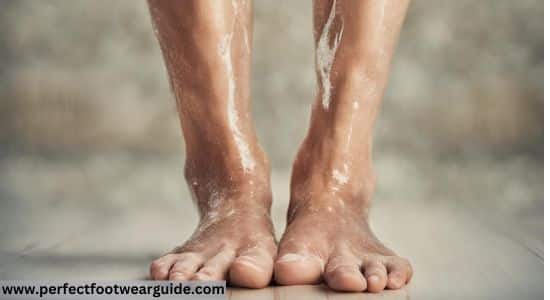
Although sweaty feet are common problems that can be managed through proper care routines, including footwear selection, sometimes medical attention is necessary. These signs will indicate it might be time for medical advice concerning sweaty feet;
Excessive Sweating (Hyperhidrosis)
If your feet sweat excessively, regardless of temperature or activity levels, you may have hyperhidrosis. This condition could indicate underlying health issues that require specific treatment regimens.
Persistent Foot Odor
Foot odor should not last long, but if it does, bacterial or fungus growth inside one’s shoe might occur. If this happens and the smell remains, seeing a specialist for more effective examinations is wise.
Skin Changes or Irritation
Any shift in the color or texture of your skin, such as reddening, itching, or peeling, could indicate that you are suffering from fungal infections or any other skin condition. A medical expert will give a suitable diagnosis and appropriate medications.
Foot Pain or Discomfort
If foot pain is constant, especially when coupled with sweating, it could indicate some underlying diseases, like flat feet or plantar fasciitis. A podiatrist can diagnose this and recommend how to deal with the disorder.
Lifestyle Impact
When extremely sweaty feet start causing significant negative effects on your life, mainly by embarrassing you publicly and hindering you from doing ordinary things, discussing your problem with doctors might be worthwhile. Their advice would help manage symptoms and improve overall foot health.
Visit a doctor because of excessive foot perspiration. They may examine you physically and assess your medical history before considering other tests and treatment options. Prescription antiperspirants, oral medications, iontophoresis (a technique using electric currents to reduce sweating), Botox injections, and surgery in severe cases can also be employed.
Remember, seeking medical advice for sweaty feet is nothing to be embarrassed about. Your doctor can help you find answers on managing the symptoms and improving your general foot well-being. These are my thoughts on sweaty feet.
Final Thought
Therefore, it is crucial to select appropriate shoes if you have sweaty feet. Focusing on air permeability, perspiration control features, and correct fit can reduce discomfort and potential health risks caused by excessive foot sweating. Breathable mesh sneakers for workouts or workouts could sort this out. Moisture-wicking socks for daily wear could also help in this situation. However, it would help to choose various footwear like the ones below for extreme foot sweat cases.
You would never go wrong with your foot hygiene and always swap shoes after use, preventing too much sweating or any other foot conditions that may come up. Then, get medical advice from doctors whenever complications happen due to excess sweating of the legs due to poor hygiene or unhygienic practices. Foot fungal infections associated with prolonged water exposure are common among athletes who practice in hot weather. With the right approach, you can keep your feet fresh, dry, and happy no matter what life throws.
Frequently Asked Questions
The following questions and answers are about good shoes for sweaty feet:
How often should I change my socks to help with sweaty feet?
If you have sweaty feet, we recommend changing your socks at least once daily. Moisture-wicking socks can keep feet dry and comfortable even for longer periods. Still, daily replacements are important to avoid bacteria build-up and odor.
What socks are good for sweaty feet?
Look for socks made of moisture-wicking materials like merino wool or synthetic blends. These materials draw sweat away from your skin, leaving your feet drier and more comfortable throughout the day. Similarly, stocking with ventilation panels should be considered to optimize breathability.
Are there lifestyle changes I can make to reduce foot sweating?
Some lifestyle changes could reduce foot perspiration. Avoid wearing tight shoes or hosiery, which inhibits circulation and intensifies perspiration. Try deep breathing exercises or meditation to relieve stress since emotional tension can cause sweating. Finally, certain foods, like watermelon or green tea, can be included as natural diuretics that help manage excess body sweating.
Can certain foods or drinks make foot sweating worse?
Although responses differ among individuals, a few people find that particular diets, such as spicy meals and coffee and alcohol intake, increase their condition by making them sweat excessively. These items stimulate sweat glands, producing more of this substance by the body’s glands. For example, suppose certain foods aggravate one’s situation with excessive perspiration. In that case, reducing intake or completely avoiding such substances is worth it.
Are there any home remedies I can try to manage sweaty feet?
Some individuals may try a few home remedies for sweaty feet symptoms. They entail soaking one’s legs in a warm salt water solution. This will reduce too much sweating while controlling odors associated with it. Alternatively, apply antiperspirant on your feet before bed to minimize night sweating. Moreover, you can place cornstarch or baking soda in the shoes to absorb excessive moisture and neutralize the smell. However, if home remedies fail to give relief or if your symptoms get worse, it is suggested that you consult with a healthcare provider for further diagnosis and treatment alternatives.
